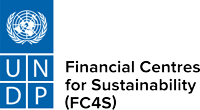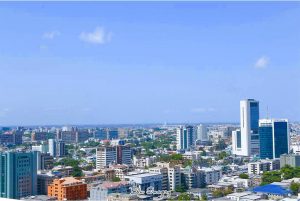New York, December 6, 2018 – Today, during the inaugural Sustainable Finance Week in New York, Bloomberg announced the formation of the U.S. Alliance for Sustainable Finance (USASF), convening 15 founding members to drive investment in clean energy and climate resilience projects across the U.S. The alliance will provide the resources and expertise to identify and streamline existing climate-finance initiatives, encourage greater transparency across climate-related financial risks and opportunities, and ultimately, drive more capital to sustainable investments.
Climate financing plays a significant role in the U.S’s ability to mitigate the global impact of greenhouse gas emissions and meet the goals of the landmark UN Paris Agreement. Financing allows states, cities and businesses to invest in emerging technologies and climate-related projects, encouraging successful initiatives to flourish and scale. Research indicates a sevenfold increase in global clean energy investment — $2.4T annually versus the current investment levels of $333.5B as estimated by BloombergNEF — is needed to limit the most devastating effects of climate change. USASF member organizations will work together to help direct and increase climate-related financing, simultaneously growing the U.S. economy and supporting the reduction of greenhouse gas emissions.
USASF’s founding members include Bank of America, BNP Paribas, Citi, Crédit Agricole CIB, Credit Suisse, Goldman Sachs, HSBC, JPMorgan Chase, Macquarie Group, Morgan Stanley, Neuberger Berman, Nuveen, S&P Global, Trillium Asset Management, and Wells Fargo. The USASF will also join the global network of Financial Centres for Sustainability (FC4S) convened by the United Nations Environment Programme.
The formation of USASF follows United Nations Secretary-General António Guterres’ call to create a new Climate Finance Leadership Initiative supporting global mobilization of private capital.
“As a world-class city and leader in innovation, New York is a natural center for the worlds of finance and sustainability to meet and collaborate. We are excited to provide the base for the U.S. Alliance for Sustainable Finance and formally join the UN Environment Programme FC4S Network,” said Mary Schapiro, Vice Chair for Global Public Policy, Bloomberg LP. “Under the FC4S umbrella our U.S.-based alliance will solidify our efforts to scale private capital in order to meet the goals of the Paris Agreement.”
USASF will undertake a series of actions, including:
- Leverage New York City’s role as an international hub for green and sustainable finance and the benefits of collaboration in order to accelerate impact;
- Support specific initiatives and projects launched by members and adding value to their green and sustainable investment and financing operations;
- Create meeting places and synergies to boost the development of the U.S. as a sustainable finance center;
- Produce, promote and share relevant information for the U.S. green and sustainable finance industry;
- Develop and participate in national and international partnerships to increase the impact of green and sustainable finance.
“With the U.S. Alliance for Sustainable Finance joining FC4S, our network reaches real universality. Together we start a new engine to accelerate the progress of green and sustainable finance,” commented Pierre Ducret, FC4S Co-Chair and Finance For Tomorrow Board Member.
“With the U.S. Alliance for Sustainable Finance (USASF) joining the FC4S family, our network is truly inclusive and comprehensive now, thanks to Bloomberg taking the lead in the U.S.,” added Kong Wei, FC4S Co-Chair and Convenor of the Shanghai Lujiazui Financial City Council Green Finance Development Committee. “We look forward to building a greener, better, more peaceful, equal and sustainable society together.”
“The FC4S Network is tackling an ambitious work programme in 2019, including a global self-assessment programme for financial centres to evaluate progress on green finance goals, and a new “lab” to develop financing solutions for underserved regions. The contributions of the USASF will be invaluable for these efforts – and we look forward to engaging with global institutions in New York to leverage their expertise,” said Jeremy McDaniels, Head of Projects, FC4S Network.
In addition to the new U.S. Alliance, the FC4S Network brings together 18 other leading financial centres from across the globe. More information about the FC4S Network and a full list of all members can be found at www.fc4s.org/. Bloomberg provides the secretariat for the U.S. Alliance for Sustainable Finance. For more information on USASF please visit https://go.bloomberg.com/events/usasf/.










































